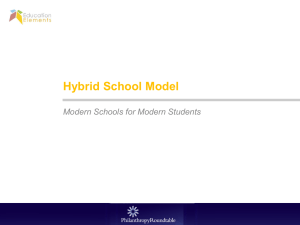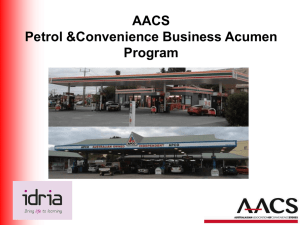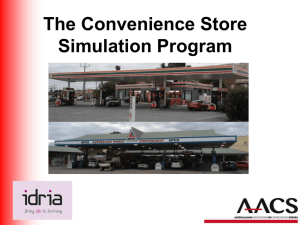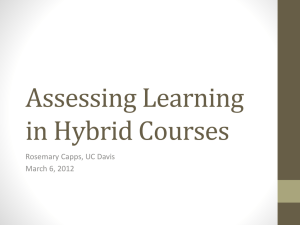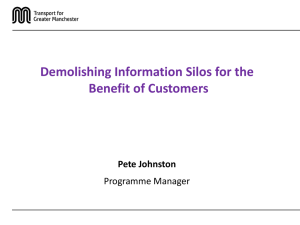Real-time Hybrid Simulation
advertisement
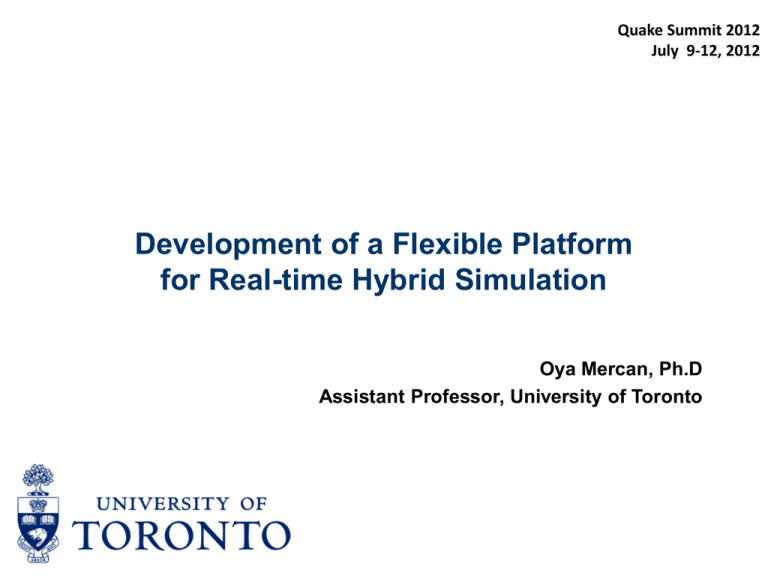
Quake Summit 2012 July 9-12, 2012 Development of a Flexible Platform for Real-time Hybrid Simulation Oya Mercan, Ph.D Assistant Professor, University of Toronto Computational/Control Platform NI PXI 1042 with a built-in NI PXI 8110 controller (deterministic, fast, CPU running RT with a built in clock) Field Programmable Gate Array, FPGA (high reliability, high determinism, true Parallelism, & re-configurability) SCB-68 (Break-Out-Box) (68 screw terminals for I/O signal conditioning) NI 5191 expansion chassis • NI 9237, Load Cell Module • NI 9239, LVDT Module • NI 9481, Relay Module Computational/Control Platform Experimental Setup Software Development PXI- Real time FPGA State Machine Based with 7 States • Safe start-up • Emergency/ regular shutdown •Command generation: either predefined or using an integration algorithm FIFO • Data logging and observation DMA • State determination of the analytical substructure •Interface with the I/O modules to receive and issue analog and digital signals. • Limit checks • Data transfer • Control law • Dither injection NI LabVIEW synchronization NI LabVIEW MATLAB Simulink NI LabVIEW Software Development LabVIEW VI for Tuning the PID Controller for a Single Actuator (Front Panel) Software Development Initialization State Open up FPGA Write the user defined values for calibration , constants PID gains, limits etc. on the FPGA Enable/Disable buttons on the front panel Go to “Start up” state Write “False” to HSM Stop and Next buttons Software Development Start-up State Wait for the user to turn HSM on Disable PID gains and filename If Next button is hit go to “Pre Zero” state If Stop button is hit go to “Stop” state Software Development Pre Zero State Software Development Zero State Impose user-defined displacements Check if the limits, next or stop buttons have been hit, decide the next state Software Development Pre Run State Clear FIFO Memory Open up the predefined displacement file Depending on whether the displacement file makes sense, decide the next state Software Development Run State Impose predefined displacements within the timed loop Either finish or abort the test and go to Startup Write data to file Software Development Stop State Immediately turn the HSM high pressure off Wait 5 seconds and turn off the low pressure and HSM completely Software Development FPGA VI The relay channels in NI 9481 are being turned on/off depending on the user input Acquire restoring force data from NI 9237, perform limit check measured displacement Limit check Dither injection command displacement Electrical command to the servo valve PID Write data to the FIFO Verification Tests To verify the developed software, hardware configuration, data transfer, as well as the PID tuning and tracking performance of the proposed system several predefined displacement histories were applied. Real-time Hybrid Simulation Pre Run State Real-time hybrid simulation considering one experimental substructure Real-time Hybrid Simulation Pre Run State – 1DOF Hybrid Simulation Information about the dll file that contains the Integration algorithm and analytical substructure is extracted and made available to the other states Depending on whether there is an error in the model dll file decide the next state Real-time Hybrid Simulation Simulink model subsystem to be converted to model dll using Simulation interface toolkit Real-time Hybrid Simulation Analytical substructure Real-time Hybrid Simulation Analytical substructure Integration Algorithm Real-time Hybrid Simulation Analytical substructure Integration Algorithm Real-time Hybrid Simulation Pre Run State – 1DOF Hybrid Simulation Information about the dll file that contains the Integration algorithm and analytical substructure is extracted and made available to the other states model dll file Depending on whether there is an error in the decide the next state Real-time Hybrid Simulation Error notification, let the user decide what to do next. Real-time Hybrid Simulation Run State – 1DOF Hybrid Simulation Current & Future Work • Software modification to control two actuators simultaneously with and without physical coupling. • Replacing PID control with other control laws. • Control of larger scale actuators (with three stage servo-valves) with the NI computational/control platform. Acknowledgements • NSERC Discovery (Grant 371627-2009) • NSERC RTI (Grant 374707-2009 EQPEQ) • Start-up funds from University of Alberta and University of Toronto Thank you! Questions ? Real-time Hybrid Simulation Experimental Setup Mechanical Components Hydraulic power supply Hydraulic service manifold 2-Stage electro servo-valves Hydraulic dynamic actuators Built-in AC LVDT Fatigue rated load cell 3000 psi (pressurized oil) 120 gpm (continuous flow) 16.5 gpm (flow capacity) ±7,5 kips (force) & ±5 inch (stroke) ±5 inch (stroke) ±12,500 kips (load capacity)

